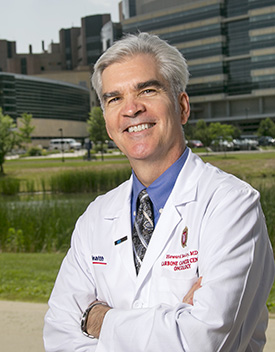Aug. 31, 2015:
A conversation with Howard Bailey, MD, director of the UW Carbone Cancer Center, which is a member of the Big Ten Cancer Research Consortium (Big Ten CRC):
Q: How do you think cancer research will change in the next 10-20 years?
The increased collection of clinical information will lead to increased numbers of specific, potential directions to pursue unlike in the past when any new direction was embraced and pursued. The future of cancer research will involve much more “virtual research” or informatics confirmation prior to pursing a direction clinically and the need to work together to identify cancer patients with shared “personalized cancer data” for innovative targeted or personalized treatments.
Q: What does translational science look like within your institution and in your collaboration with other Big Ten Cancer Research Consortium member institutions?
Similar to other Big Ten Cancer Centers, translating basic knowledge gained into improved cancer prevention, diagnosis, and treatment is one of our main priorities. This is done through cancer-specific research groups (e.g. breast, prostate, or lung cancer groups) and target/discipline-specific research groups (e.g. immunology, imaging). These same research groups interact with other Big Ten Cancer Centers to expand each other’s influence and value to patients.
Q: In what ways is your institution involved in expanding access to clinical trials throughout the communities you serve?
Over the last 20 years, the UW Carbone Cancer Center has developed multiple research networks around oncology practices, healthcare systems, and hospitals to expand access to cancer patients but also primary care patients and communities for translational, clinical, and population studies.
Q: How is the Big Ten CRC unique from other research consortia in which you participate?
The consortium forms a strong collaboration because of the cancer advances each Big Ten institution has already made and the research infrastructures in place at each location. And we know the consortium will leverage and grow the existing relationships among cancer centers in development of clinical trials. This is a win-win for all of these institutions and, more importantly, for all cancer patients who will be affected by the novel treatments of tomorrow.
About the Big Ten Cancer Research Consortium: The Big Ten Cancer Research Consortium creates a unique team-research culture to drive science rapidly from ideas to treatment-changing paradigms. Within this innovative environment, today’s research leaders collaborate with and mentor the research leaders of tomorrow with the unified goal of improving the lives of all patients with cancer.
About the Big Ten Conference: The Big Ten Conference is an association of world-class universities whose member institutions share a common mission of research, graduate, professional and undergraduate teaching and public service. Founded in 1896, the Big Ten has sustained a comprehensive set of shared practices and policies that enforce the priority of academics in the lives of students competing in intercollegiate athletics and emphasize the values of integrity, fairness and competitiveness. The broad-based programs of the 14 Big Ten institutions will provide over $200 million in direct financial support to almost 9,500 students for more than 11,000 participation opportunities on 350 teams in 42 different sports. The Big Ten sponsors 28 official conference sports, 14 for men and 14 for women, including the addition of men’s ice hockey and men’s and women’s lacrosse since 2013. For more information, visit www.bigten.org.

















Subscribe to the Big Ten CRC Newsletter X
X Facebook
Facebook YouTube
YouTube